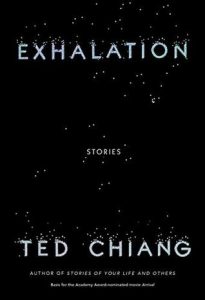
Exhalation: Stories is a collection of award-winning stories (at least five Hugos and several Nebulas between them) by American speculative fiction writer Ted Chiang. These moderately-paced stories are entertaining, but they are also examinations of ideas, touching on such serious topics as religion, meta-cognition (thinking about thinking), and AI. These are stories to take your time over, because they make you think, and in the way of the best kind of science fiction: about what it means to be human.
These stories have already been reviewed by many people; I doubt I have anything to add to the conversation, except to say that I liked them. In order by how much they appealed to me (a totally subjective measure), here are the stories. (Warning, a few mild spoilers ahead):
- The Merchant and the Alchemist’s Gate: Time travel in an Arabian Nights-style tale, with stories within a story, and lessons about acceptance of what cannot be changed. An inability to change the past is not necessarily tragic.
- Anxiety is the Dizziness of Freedom: Electronic devices allow communication across parallel worlds. A woman with a guilty conscience uses her unethically-obtained wealth to benefit someone else she respects. This story is an antidote to the nihilistic many worlds theory, which says that all choices are equally probable, and cancel each other out. Chiang argues that if an individual’s character is revealed by the choices they make over time, some choices would be impossible for the character to make, even across many worlds.
- Omphalos: A scientist on a provably God-created world has a religious crisis on discovering that their world was a trial run, and they are not the true centre of creation.
- The Great Silence: The physicist Enrico Fermi asked where are all those alien civilisations that are theorised to be out there. Chiang asks if we would even be able to recognise them, given our inability to recognise and communicate with the alien intelligences in other Earth-bound creatures.
- Exhalation: In an enclosed world of mechanical beings, a scientist undergoes a truly dangerous self-examination.
- The Truth of Fact, The Truth of Feeling: In two intertwined narratives, one examines the impact of easy searchability of recorded video of an individual’s entire life on that person, when that factual record doesn’t match the individual’s unreliable memory. (The conclusion—that people would face up to their failures when confronted with the video evidence—seems rather optimistic to me.) The other narrative describes the impact of written documentation on a tribe’s oral culture, and the tribal elder’s drawing a distinction between the truth of a fact (from the written record or eye-witness testimony) and the truth of a person or group’s narrative of their identity, which may not jibe with the recorded facts.
There were three other rather less-successful stories in the collection, including the longest, The Lifecycle of Software Objects. It drags, unfortunately. It isn’t very successful as a story, even though it is worth skimming as an exploration of an ethical quandary we may face in the not too distant future: if we do succeed in creating self-aware AIs, what responsibilities will we have towards them in terms of their ongoing support and education? Chiang argues that if we expect AIs to eventually become as capable (at least) as adult humans, their consciousnesses will need to be grown organically, and tended and educated just like human children; we won’t get there quickly or by simple machine learning.
